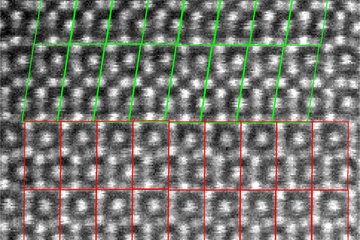All genres
601.
Talk
Probing dislocation - grain boundary interactions and grain boundary phase transformations: New experiments on Cu bicrystals. Seminar at Nanyang Technological University, School of Mechanical & Aerospace Engineering, Singapore, Singapore (2018)
602.
Talk
Probing the strength and atomic structure of individual grain boundaries in Cu. Seminar at The University of Sydney, Faculty of Engineering & Information Technologies, Sydney, Australia (2018)
603.
Talk
Changing Material Properties by Grain-Boundary Phase Transformation. Seminar at University of New South Wales, School of Materials Science and Engineering, Sydney, Australia (2018)
604.
Talk
Tribolayer formation during macro- & microscale cyclic contact. MSE Materials Science and Engineering, Darmstadt, Germany (2018)
605.
Talk
Tribolayer formation during macro- & microscale cyclic contact. 45th Leeds-Lyon Symposium on Tribology, Leeds, UK (2018)
606.
Talk
Coexistence of different atomic motifs in a <111> Cu tilt grain boundary resolved by STEM. 3rd Sino-German Symposium on Advanced Electron Microscopy of Interface Structures and Properties of Materials Tsinghua University, Beijing, China (2018)
607.
Talk
In-situ TEM Study of Dislocation Plasticity in Single Crystal FeCrCoMnNi HEA. 19th International Microscopy Congress (ICM19), Sydney, Australia (2018)
608.
Talk
Atomic scale observations of grain boundary phase transformations. Materials Science and Engineering Congress 2018, Darmstadt, Germany (2018)
609.
Talk
Towards understanding fracture initiation in nanotribology. Materials Science and Engineering 2018 MSE, Darmstadt, Germany (2018)
610.
Talk
Quantifying dislocation slip transmission by in situ micromechanics. ICSMA 2018, Ohio State University, Columbus, OH, USA (2018)
611.
Talk
High temperature mechanical characterization of Copper-Silver- and Copper-Zirconium thin film libraries produced by combinatorial materials synthesis approach. Gordon Research Seminar on Thin Film and Small Scale Mechanical Behavior (GRS) 2018, Lewiston, ME, USA (2018)
612.
Talk
Mechanical characterization of copper thin films produced by photolithography with a novel microscale high temperature loading rig. The International Conference on Experimental Mechanics, (ICEM) 2018, Brussels, Belgium (2018)
613.
Talk
Microscale Tribology of Pearlite Steel and the Deformation of Cementite. 10th European Solid Mechanics Conference ESMC 2018, Bologna, Italy (2018)
614.
Talk
Ag Induced Phase Transformation of a Sigma 5 Grain Boundary in Copper. THERMEC’2018, Paris, France (2018)
615.
Talk
Pathways for reliable lead-free solder joints: micro-fracture properties of Au-Sn based solder. European solid mechanics conference (ESMC) 2018, Bologna, Italy (2018)
616.
Talk
In-situ TEM study on deformation behaviors of CrMnFeCoNi single crystal high entropy alloys. European Solid Mechanics Conference (ESMC) , Bologna, Italy (2018)
617.
Talk
Deformation of nanotwinned silver by micropillar compression. EMRS Spring Meeting, Strasbourg, France (2018)
618.
Talk
Reliability of small scale elasto-plastic fracture mechanical testing. 10th European Solid Mechanics Conference (ESMC 2018), Bologna, Italy (2018)
619.
Talk
Dislocation source activation by nanoindentation in single crystals and at grain boundaries. E-MRS Spring, Strasbourg, France (2018)
620.
Talk
Strain rate sensitivity of dislocation transmission through individual copper grain boundaries. E-MRS Spring Meeting 2018, Strasbourg, France (2018)











